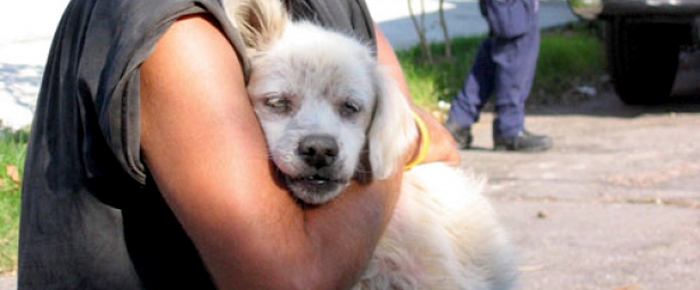
By Janet McAfee
What would happen to your pets in the event of an earthquake, a hurricane, or a flood? In California, our greatest concern is the possibility of an earthquake. However, this September our Coachella Valley was hit by a strong rainstorm that brought massive flooding to many of our desert cities, sweeping away at least several domestic pets.
The heavy rain and wind began early in the morning of September 8, flooding roads, submerging vehicles, and creating mayhem throughout our community. The owners of Bimbo, an 18-yr-old Collie mix, went out in the yard to get him to safety only to discover he was missing. Bimbo was swept downstream and found trapped under a shed at Ivey’s Ranch in Thousand Palms. He spent a night with the ranch’s employees, and then ended up at the county shelter. The frail, elderly animal had no id and was not microchipped. KMIR news featured his plight, and his lucky owners recognized him on Facebook.
September is National Emergency Preparedness Month. Here are some things pet parents can do in advance of a natural disaster or emergency to keep their “furfriends” safe.
TAG AND MICROCHIP YOUR PET
Microchipping is your pet’s best ticket to getting home if he gets lost or displaced in an emergency. The tiny chip in the back of his neck contains owner contact information that can be read by any scanner at a shelter or vet clinic. An engraved tag with your phone number on his collar is the quickest way to have your pet returned. The tag should include any important medical information. Identification on indoor cats is important as they could easily escape if your home is damaged.
PLAN A PET FRIENDLY PLACE TO STAY
Locate pet-friendly hotels out of your area in advance. Plan to stay with a friend or relative who will allow your pet to stay in an emergency. You can locate pet-friendly hotels at several websites including www.DogWonderful.com , www.bringyourpet/com, and www.PetTravel.com. Locate boarding facilities where you can safely keep your animals.
USE THE BUDDY SYSTEM
Plan ahead with a trusted friend or neighbor, and give them a key to your home in the event you are caught outside evacuation lines when an order is issued. They can be in charge of evacuating your pets.
PREPARE AN EMERGENCY KIT FOR EACH ANIMAL
Stock up on basic supplies as retail stores could shut down in the event of an emergency. Have a one week supply of pet food on hand. Store a supply of pet food in a water-tight container and rotate it every few months to ensure freshness. People and pets will require a supply of drinking water if officials declare your household water unfit to drink. Keep an extra supply of their medication handy. Include pet photos and vaccination records in your kit. Other items to have ready include a flashlight, scoopable litter, blanket, liquid soap dish and disinfectant, and photocopies of medical records.
HAVE CARRIERS AND LEASHES FOR EACH ANIMAL
This is particularly important for multiple pet households. All animals should wear their collars with ID tags at all times. Carriers are essential for car travel and transport. Pets may be stressed, and carriers will prevent them from escaping.
EVACUATING WITH BIRDS
Our feathered friends must be transported in a secure travel cage or carrier. A blanket over the bird’s cage may reduce stress. In warm weather, carry a spray bottle to periodically moisten your bird’s feathers. As with all your pets, have a current photo, and keep your bird’s leg band on for identification. Birds must eat on a daily basis, so obtain a timed feeder that will ensure his daily feeding schedule should you have to leave unexpectedly.
DON’T LEAVE YOUR PETS BEHIND
We all remember the tragic scenes of desperate animals left behind in Katrina, and not allowed into rescue boats. In response to that tragedy, the 2007 PETS Act authorized FEMA to provide rescue, care, and shelter to people with domestic pets and service animals. If the situation isn’t safe for you, it’s not safe for your animals. If the officials block off access to your residence, your pet could suffer dire consequences.
COMFORT YOUR ANIMALS
Your calm voice and presence will help reduce their stress if you and your animals are displaced. Cats in particular don’t like to be transported to unfamiliar locations. Play soft music on the radio. Keep a familiar toy in their kennel.
 HELP FIND HOLLY, MISSING DOG IN LA QUINTA
HELP FIND HOLLY, MISSING DOG IN LA QUINTA
Animals can become disoriented and wander away during a severe storm or other natural disaster. Bring them inside when any severe form of weather strikes, or in the event of earthquake or other crisis.
On September 8, the day the heavy rains plummeted the Coachella Valley, another dog went missing in the city of La Quinta. Holly, pictured here, is a Greyhound/Whippet/Chihuahua mix dog who bolted during the storm. She went missing near the streets of Springtime Way and Summer View by John Adams Elementary School. Holly is cream colored with large pointed ears. She is a medium size dog weighing about 30 pounds, and is microchipped and wearing a collar. The dog is a bit skittish, and if you spot her please call Deana at (760) 574-5985 or Daniel at (619) 743-2314 immediately. There is a reward offered for her safe return. Please keep an eye out for this precious pup!
Next week’s column will include an update on the search for Holly, and some tips to locate your pet should he or she ever go missing.
Jmcafee7@verizon.net









































